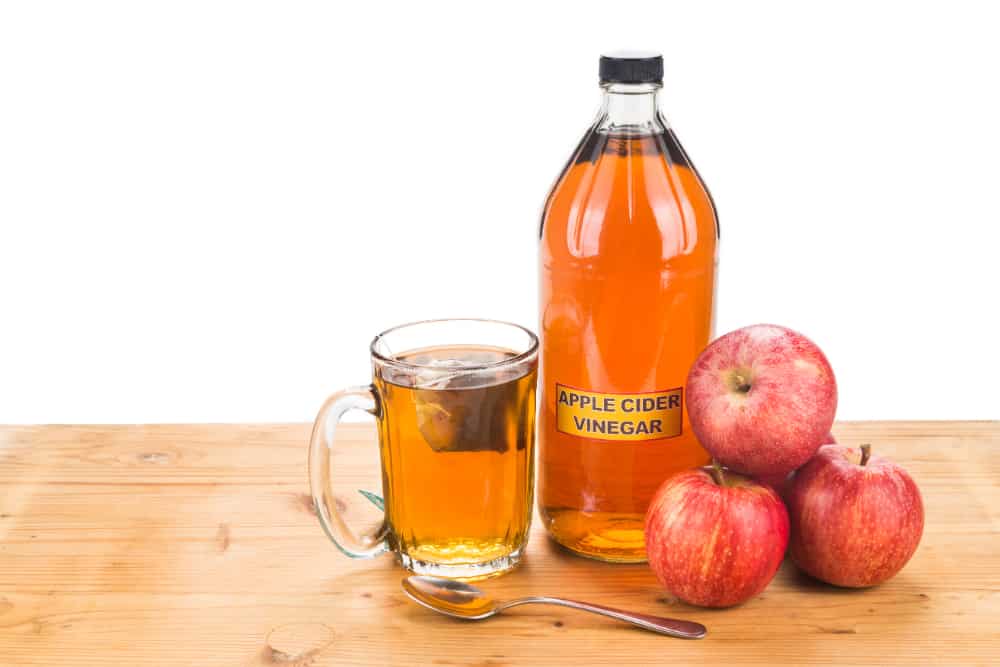Last Updated on January 6, 2025
Apple cider vinegar does not cause miscarriage in early pregnancy. Although there is limited scientific evidence on its effects during pregnancy, it is generally considered safe to consume in moderation.
Apple cider vinegar has been used for centuries as a natural remedy for various ailments and as a household product due to its acidic properties. However, pregnant women should consult their healthcare provider before incorporating it into their diet to ensure it is suitable for their specific circumstances.
Remember that maintaining a balanced and nutritious diet is crucial for the health of both the mother and the developing baby during pregnancy.

Credit: momlovesbest.com
Related: Can You Get Fired For Being Pregnant?
Understanding Apple Cider Vinegar (Acv)
Apple cider vinegar (acv) has gained popularity in recent years for its potential health benefits. While it has been used for centuries in various cultures, there is a growing interest in its effects during early pregnancy. Let’s dive into what acv is and its composition to better understand its potential impact.
Explanation Of What Apple Cider Vinegar Is And Its Composition
- Apple cider vinegar is a type of vinegar made from fermented apple juice.
- It is rich in acetic acid, which is responsible for its distinctive sour taste.
- Acv also contains natural sugars, vitamins (like vitamin c and b-vitamins), minerals (such as potassium and calcium), and trace amounts of amino acids and antioxidants.
Discuss Its Acid Content, Enzymes, And Potential Effects On The Body
- Acv is highly acidic, typically having a ph level between 2.5 and 3.5.
- The acid content may help improve digestion and absorption of nutrients when consumed in moderation.
- Enzymes present in acv, such as pectinase and amylase, may aid in breaking down carbohydrates and promoting better digestion.
- Some studies suggest that acv might help regulate blood sugar levels and support weight management by increasing feelings of fullness and reducing appetite.
- However, it’s important to note that there is limited scientific evidence to support most of these claims, and further research is needed to verify their effectiveness.
Mention Its Common Uses In Alternative Medicine And Culinary Practices
- Acv has long been used in alternative medicine for various purposes, including as a natural remedy for digestive issues, sore throat, and skin conditions like acne.
- In culinary practices, acv is often used as a salad dressing, marinade, or to add flavor to dishes.
- It can also be diluted and used as a household cleaner due to its antimicrobial properties.
Remember, while apple cider vinegar may have potential benefits, it’s crucial to consult with a healthcare professional before incorporating it into your diet, particularly during pregnancy. They can provide personalized advice based on your specific situation and medical history.
Understanding the basics of apple cider vinegar, its composition, and possible effects on the body allows us to explore its potential impact on early pregnancy. Keep reading to learn more about this fascinating topic.
Exploring The Safety Of Apple Cider Vinegar During Pregnancy
Pregnancy is a crucial time for any woman, with numerous concerns and questions about what is safe for both her and her baby. One popular topic that often arises is the safety of consuming apple cider vinegar (acv) during pregnancy.
While acv has been used for centuries for its potential health benefits, including aiding digestion and regulating blood sugar levels, its specific effects during pregnancy are still not well-researched. Let’s delve into the topic and separate fact from fiction.
Limited Scientific Research On Acv And Pregnancy
Scientific research on the specific effects of apple cider vinegar during pregnancy is limited. Most studies available focus on the general effects of vinegar or acetic acid, the main component of acv, and not specifically on pregnant women. Therefore, it is essential to approach claims about acv and pregnancy with caution, as the lack of substantial evidence makes it challenging to draw definitive conclusions.
Lack Of Substantial Evidence For Acv Causing Miscarriage
One common concern is whether consuming acv during early pregnancy can lead to a miscarriage. However, it is important to note that there is no substantial evidence to support this claim. Miscarriages can occur due to a variety of factors, such as genetic abnormalities or underlying health conditions, which are unrelated to the consumption of acv.
While anecdotal reports may circulate, it’s crucial to rely on scientific research that confirms the connection between acv and miscarriage before jumping to conclusions.
Related: Can I Crack My Back While Pregnant?
Potential Risks And Precautions
While there is no concrete evidence to suggest that acv directly causes harm during pregnancy, it is still wise to exercise caution and consider the potential risks and precautions associated with its consumption. Some factors to keep in mind include:
- Acidic nature: Acv is highly acidic, which can potentially irritate and damage the tooth enamel when consumed in its concentrated form. It is advisable to dilute acv with water or incorporate it into meals.
- Digestive discomfort: Acv’s acidic nature may intensify heartburn or other digestive issues that are common during pregnancy. If you experience discomfort, it may be prudent to reduce or avoid consuming acv altogether.
- Medication interactions: Acv has the potential to interact with certain medications, including diabetes drugs and diuretics. If you are on any medication, it is crucial to consult with your healthcare provider before incorporating acv into your routine.
Moderation, Dilution, And Consultation With A Healthcare Provider
Regardless of the uncertainty surrounding acv during pregnancy, it is always recommended to practice moderation, dilution, and consultation with a healthcare provider. Some key points to remember include:
- Moderation: It’s important not to exceed recommended amounts of acv to minimize any potential risks.
- Dilution: Diluting acv with water or adding it to your meals can help reduce its acidity and minimize any potential negative effects.
- Healthcare provider consultation: If you have any concerns or questions about incorporating acv into your pregnancy diet, it is best to consult with your healthcare provider for personalized advice based on your individual circumstances.
While the safety of apple cider vinegar during pregnancy is still not well-established due to limited scientific research, there is currently no substantial evidence suggesting that acv causes miscarriage. However, it is vital to take precautions, practice moderation, dilute acv, and consult with a healthcare provider to ensure a safe and healthy pregnancy.
Remember, your healthcare provider is the best source of guidance when it comes to making informed choices about your diet during pregnancy.
Related: Can You Drink Body Armor While Pregnant?
Nurturing A Healthy Pregnancy: Essential Tips For Expectant Mothers
Expectant mothers often wonder how they can ensure a healthy pregnancy. While there is an abundance of advice out there, it’s important to focus on the key factors known to contribute to a positive pregnancy outcome. This section will offer practical tips and guidance for maintaining a healthy pregnancy, covering a balanced diet, regular exercise, prenatal care, and avoiding harmful substances.
Balanced Diet: Fueling Your Pregnancy Journey
Maintaining a balanced diet is crucial to support the growth and development of your baby. Here are some key points to remember:
- Consume a variety of nutrient-rich foods, including fruits, vegetables, whole grains, lean proteins, and dairy products.
- Ensure an adequate intake of prenatal vitamins and minerals, as advised by your healthcare provider.
- Opt for frequent, smaller meals to combat any pregnancy-related nausea or discomfort.
- Stay hydrated by drinking plenty of water throughout the day.
Regular Exercise: Empowering Your Body And Mind
Exercise during pregnancy has numerous benefits for both you and your baby. Consider the following:
- Engage in low-impact activities such as walking, swimming, or prenatal yoga, but consult with your healthcare provider before starting any new exercise routine.
- Aim for at least 30 minutes of moderate exercise most days of the week.
- Listen to your body and adjust your workout intensity as needed.
- Avoid exercises involving high impact or risk of falling.
Prenatal Care: Partnering With Your Healthcare Provider
Regular prenatal care plays a vital role in monitoring the progress of your pregnancy. Here’s what you need to know:
- Schedule regular appointments with your healthcare provider to ensure comprehensive prenatal care.
- Discuss any concerns or questions you may have during these visits.
- Adhere to the recommended prenatal screenings and tests.
- Seek support and guidance for managing any pregnancy-related discomfort or issues.
Avoiding Harmful Substances: Protecting Your Baby’S Health
Certain substances can pose a risk to your baby’s health during pregnancy. Keep these points in mind:
- Avoid cigarette smoke, alcohol, and illicit drugs, as they can harm the development of your baby.
- Limit caffeine intake to recommended levels.
- Discuss the safety of any medications, herbal supplements, or alternative remedies with your healthcare provider.
- Minimize exposure to environmental toxins and chemicals.
Open Communication With Your Healthcare Provider
Maintaining open communication with your healthcare provider is crucial for a healthy pregnancy. Remember these important aspects:
- Share any concerns, questions, or changes in your health with your healthcare provider promptly.
- Ask for clarification and seek advice regarding alternative remedies or natural health products.
- Speak openly about your emotional well-being during pregnancy.
- Trust in the expertise and guidance of your healthcare provider.
By following these essential tips for a healthy pregnancy, you are setting a strong foundation for the well-being of both you and your baby. Keep in mind that each pregnancy journey is unique, so always consult with your healthcare provider for personalized advice and guidance.
Frequently Asked Questions On Can Apple Cider Vinegar Cause Miscarriage In Early Pregnancy?
Can Apple Cider Vinegar Cause A Miscarriage In Early Pregnancy?
Apple cider vinegar is generally considered safe in moderation during pregnancy and is unlikely to cause a miscarriage.
Conclusion
While there are mixed opinions and limited scientific evidence regarding the safety of consuming apple cider vinegar during early pregnancy, it is advisable to err on the side of caution. The acidic nature of apple cider vinegar may cause irritation and discomfort, especially in individuals with sensitive stomachs.
Additionally, the potential risks of consuming unpasteurized or non-diluted forms of apple cider vinegar cannot be ignored. It is crucial to consult with a healthcare professional before incorporating apple cider vinegar into your pregnancy diet. They can provide personalized guidance based on your specific health needs and advise you on safer alternatives for managing pregnancy symptoms such as heartburn and morning sickness.
Remember, maintaining a balanced and nutritious diet is essential for a healthy pregnancy. Listen to your body, prioritize your well-being and make informed decisions about what you consume during this crucial time.











